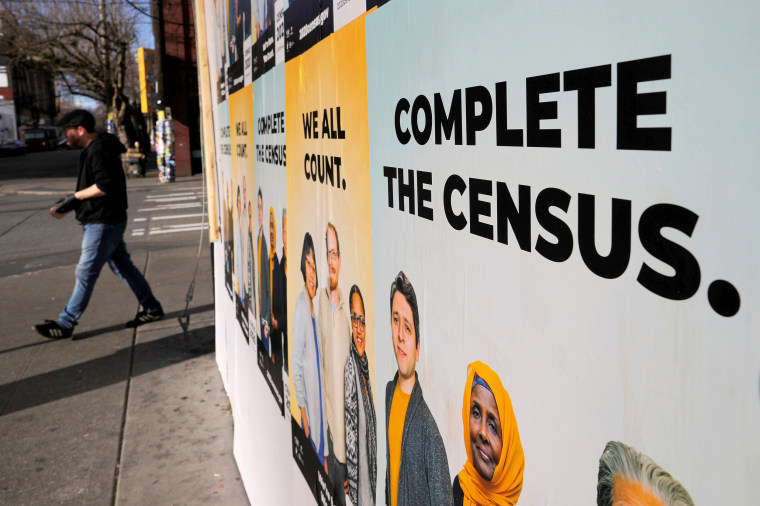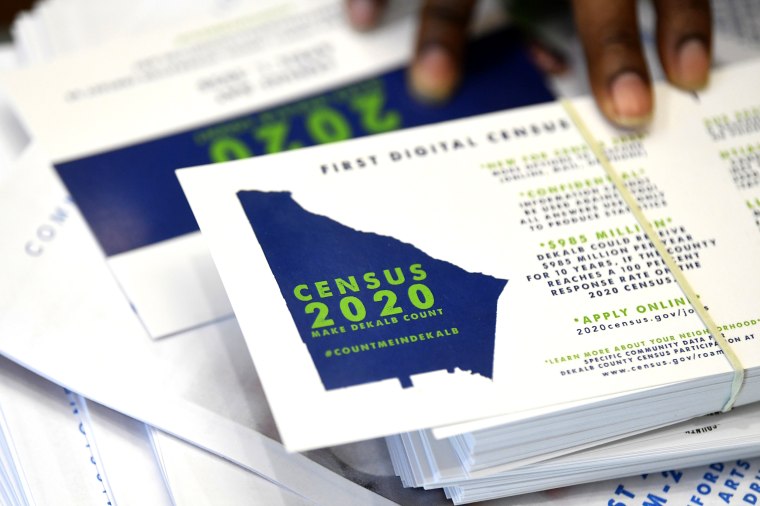When Commonpoint Queens started its census outreach efforts earlier this year, the social services group would sometimes get 300 people to fill out the government survey in a single day.
Now, with much of the nation shut down by the coronavirus, they're lucky to get 50 to watch a webinar.
"I want to be positive and say that we are getting through to the community," said Fadia Mohama, the group's census director. But when her group members are in the community doing things like delivering food to the needy and bring up the census, "a lot of people that we've talked to have said that now is not a good time because their family member is sick or they have just lost their job," she said.
The organization is trying new ways to engage the community, connecting with food banks and health care centers to pass out flyers, recruiting health care experts to talk in their webinars, even getting DJs to give it shoutouts during online performances — all alongside efforts to send mass texts to registered voters.
But Mohama said it's hard to get people who are struggling with social distancing measures and making ends meet to care about the census. And Census Bureau data show that the response rate for households in Queens, New York, one of the most diverse counties in the nation, is below the city, state and national levels, at about 44 percent versus 45 percent for New York City, 50 percent for the state and 56 percent for the country as a whole.
Community groups across the U.S. are facing a daunting challenge as they try to inform historically hard-to-count minority communities why the census is important. Population data, they say, are used to distribute federal money — currently about $675 billion a year — to states and communities for schools, hospitals and roads, as well as Medicaid, welfare, school lunches, food stamps, college grant money for low-income students and dozens of other programs for those in need.
Census data are also used to determine how many seats in Congress a state receives, and they inform how congressional and state legislative districts are drawn. Businesses use the information to find good places to open up shop.
Full coverage of the coronavirus outbreak
But as the pandemic puts the census count on hold for months while states wait to come out of lockdown, advocates warn that their outreach efforts are coming up short — increasing the odds that the communities that need federal help the most won't get their fair share in the coming decade.
"If you don't respond to the census, you don't exist in the eyes of the government," said Chuck Park, civic participation manager at the MinKwon Center for Community Action, which serves the Asian community in the Flushing neighborhood of Queens, home to one of New York City's largest Chinatowns. "If you don't exist, then you don't need resources that you have a right to or political representation for your community."

States like New York, California and Texas have the greatest risk of undercounts because of their large populations of hard-to-count communities, researchers at the Urban Institute found. Those communities, which include minority populations, tend to have lower average incomes and larger numbers of renters, new and undocumented immigrants and children under age 5. In 2010, the census undercounted African American and Hispanic populations by 2.1 percent and 1.5 percent, respectively, the Census Bureau estimates — putting resources in those communities at risk.
Meanwhile, black and Latino populations also have been disproportionately affected by the coronavirus.
"It's more important than ever to understand where these communities are and who lives in these communities and let them know that if we are susceptible to something like COVID, we need to understand where these communities are so that we can help these communities through federal interventions," like health care programs for low-income communities that receive funds based on census data, said John Thompson, a career Census Bureau employee who became its director under President Barack Obama.
Download the NBC News app for full coverage and alerts about the coronavirus outbreak
Responding to the risk of an undercount because of the pandemic, the Census Bureau has shifted its timetable to complete this year's count, extending the response deadline from the end of July to the end of October. The agency halted field operations in mid-March and won't restart until June 1. Meanwhile, knocking on doors to survey those who haven't responded by mail or phone or online won't begin until mid-August.
It's also asking Congress to delay the deadline for state population counts used in congressional apportionment from the end of the year to next April and the deadline for the data used for state redistricting from next March to next July, said Rep. Carolyn Maloney, D-N.Y., chairwoman of the Oversight and Reform Committee. And to explain why responses are important even during a pandemic, the agency plans to target television ads at the local level, Thompson said.
Still, advocacy groups typically try to reach community members before the census takers come knocking so residents understand why their participation is vital to their neighborhoods and to tamp down any confusion and fear of government officials. That seems almost impossible now with just weeks to go before federal field operations phase back in, the groups say.
And the omnipresent threat of the coronavirus will only worsen the response rate in communities that already distrust the government, the advocates say.
Park, of the MinKwon Center for Community Action, said the Trump administration's policies to curtail immigration have contributed to the unease.
"In the current situation, there's a hostile administration — federal administration — which is actively trying to scare immigrant populations especially, making these communities extremely unlikely to respond," he said.
For some African Americans, for whom skepticism of government runs deep, it may be hard to accept that census officials are trying to help, said Marcella Tillett of the Brooklyn Community Foundation.
"For many black families and many black communities throughout the history of this country, someone who works for the government knocking at your door was never good news," Tillett said. "That was never something that was going to result in you being better taken care of, having more representation, having more schools."
That's one reason advocates believe in-person interaction is key.
Whitney Tucker, research director for the North Carolina child advocacy group NC Child, said that without doing the kinds of things activists normally would to reach residents, like setting up booths at farmers markets and working with child care centers to hand out pamphlets, an undercount is all but guaranteed.
"I think the pandemic is severely going to depress the count," Tucker said. "And I hate to say that, because we've been working on this for over a year."
Terri Ann Lowenthal, a consultant and former staff director of the House census oversight subcommittee, said the count will be even more difficult with lower-income people losing their jobs and being forced out of their homes because of the coronavirus.
"Those who have been hit the worst economically by this health crisis are those with lower-wage jobs, and they may face greater economic dislocation," she said.
While the Census Bureau does try to hire canvassers locally to help counter any distrust, Park still hopes his organization can turn the numbers around before the census field workers start knocking on doors.
It plans to start canvassing door to door as soon as the stay-at-home order lifts. And while it might still be limited by some social distancing measures, that face-to-face contact from trusted organizations — even if from 6 feet away — is important, Park said.
"It creates a sense of fear when people see strangers walking around buildings, like with federal badges, knocking on doors, even though they have good intentions," Park said. "We don't want to create negative vibes around the census."
